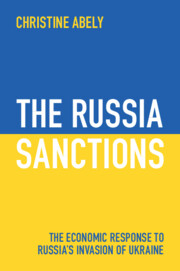21 results
4 - The Russian War and Its Consequences
-
- Book:
- A Federalist Alternative for European Governance
- Published online:
- 12 December 2024
- Print publication:
- 19 December 2024, pp 101-147
-
- Chapter
- Export citation
7 - Economic Tradecraft and Commercial Diplomacy
-
-
- Book:
- Diplomatic Tradecraft
- Published online:
- 15 March 2024
- Print publication:
- 28 March 2024, pp 150-173
-
- Chapter
- Export citation
2 - Diplomacy as an Instrument of Statecraft
-
-
- Book:
- Diplomatic Tradecraft
- Published online:
- 15 March 2024
- Print publication:
- 28 March 2024, pp 31-50
-
- Chapter
- Export citation
Building Castles in the Air? The EU Blocking Regulation and the Protection of the Interests of Private Parties
-
- Journal:
- Cambridge Yearbook of European Legal Studies / Volume 25 / December 2023
- Published online by Cambridge University Press:
- 19 December 2023, pp. 64-80
-
- Article
-
- You have access
- Open access
- HTML
- Export citation

The Russia Sanctions
- The Economic Response to Russia's Invasion of Ukraine
-
- Published online:
- 14 December 2023
- Print publication:
- 21 December 2023
Enforcing economic sanctions by tarnishing corporate reputations
-
- Journal:
- Business and Politics / Volume 26 / Issue 1 / March 2024
- Published online by Cambridge University Press:
- 08 September 2023, pp. 102-123
-
- Article
-
- You have access
- Open access
- HTML
- Export citation
Fighting Cyber Attacks with Sanctions: Digital Threats, Economic Responses
-
- Journal:
- Israel Law Review / Volume 57 / Issue 1 / March 2024
- Published online by Cambridge University Press:
- 09 May 2023, pp. 135-174
-
- Article
-
- You have access
- HTML
- Export citation
8 - The Use of Force by States
-
- Book:
- Fundamental Perspectives on International Law
- Published online:
- 23 November 2022
- Print publication:
- 15 December 2022, pp 442-493
-
- Chapter
- Export citation
20 - Collective Military Security and Economic Sanctions: How to Handle Rogues, Cheaters, and Fanatics
- from Part V - The Long-Term Goal: Envisioning a Mature System of Global Governance for the Twenty-Second Century
-
- Book:
- Planet in Peril
- Published online:
- 13 October 2022
- Print publication:
- 13 October 2022, pp 301-317
-
- Chapter
- Export citation
The Impact of Western Sanctions on Putin's War
-
- Journal:
- Canadian Journal of Political Science/Revue canadienne de science politique / Volume 55 / Issue 2 / June 2022
- Published online by Cambridge University Press:
- 28 March 2022, pp. 496-501
-
- Article
-
- You have access
- Open access
- HTML
- Export citation
14 - Disciplining Artificial Intelligence Policies
- from Part IV - International Economic Law Limits to Artificial Intelligence Regulation
-
-
- Book:
- Artificial Intelligence and International Economic Law
- Published online:
- 01 October 2021
- Print publication:
- 14 October 2021, pp 274-292
-
- Chapter
-
- You have access
- Open access
- HTML
- Export citation
1 - The Principle of Common Concern of Humankind
- from Part I - Theory
-
-
- Book:
- The Prospects of Common Concern of Humankind in International Law
- Published online:
- 04 May 2021
- Print publication:
- 13 May 2021, pp 3-92
-
- Chapter
- Export citation
5 - Reshaping the Law of Economic Sanctions for Human Rights Enforcement
- from Part II - Case Studies
-
-
- Book:
- The Prospects of Common Concern of Humankind in International Law
- Published online:
- 04 May 2021
- Print publication:
- 13 May 2021, pp 247-291
-
- Chapter
- Export citation
Do Targeted Trade Sanctions Against Chinese Technology Companies Affect US Firms? Evidence from an Event Study
-
- Journal:
- Business and Politics / Volume 23 / Issue 3 / September 2021
- Published online by Cambridge University Press:
- 02 March 2021, pp. 330-343
-
- Article
- Export citation
Estimating signaling games in international relations: problems and solutions
-
- Journal:
- Political Science Research and Methods / Volume 9 / Issue 3 / July 2021
- Published online by Cambridge University Press:
- 09 December 2019, pp. 565-582
-
- Article
- Export citation
The Legality of US Investment Sanctions against Iran before the ICJ: A Watershed Moment for the Essential Security and Necessity Exceptions
-
- Journal:
- Canadian Yearbook of International Law / Annuaire canadien de droit international / Volume 56 / October 2019
- Published online by Cambridge University Press:
- 12 September 2019, pp. 328-364
- Print publication:
- October 2019
-
- Article
- Export citation
Political Effectiveness, Negative Externalities, and the Ethics of Economic Sanctions
-
- Journal:
- Ethics & International Affairs / Volume 33 / Issue 3 / Fall 2019
- Published online by Cambridge University Press:
- 06 September 2019, pp. 279-289
-
- Article
- Export citation
Economic Sanctions and Government Spending Adjustments: The Case of Disaster Preparedness
-
- Journal:
- British Journal of Political Science / Volume 51 / Issue 1 / January 2021
- Published online by Cambridge University Press:
- 26 July 2019, pp. 394-411
-
- Article
- Export citation
THE EUROPEAN COURT OF HUMAN RIGHTS FACING THE SECURITY COUNCIL: TOWARDS SYSTEMIC HARMONIZATION
-
- Journal:
- International & Comparative Law Quarterly / Volume 66 / Issue 4 / October 2017
- Published online by Cambridge University Press:
- 22 August 2017, pp. 783-804
- Print publication:
- October 2017
-
- Article
- Export citation
China's Economic Sanctions against Vietnam, 1975–1978
-
- Journal:
- The China Quarterly / Volume 212 / December 2012
- Published online by Cambridge University Press:
- 10 December 2012, pp. 1040-1058
- Print publication:
- December 2012
-
- Article
- Export citation

